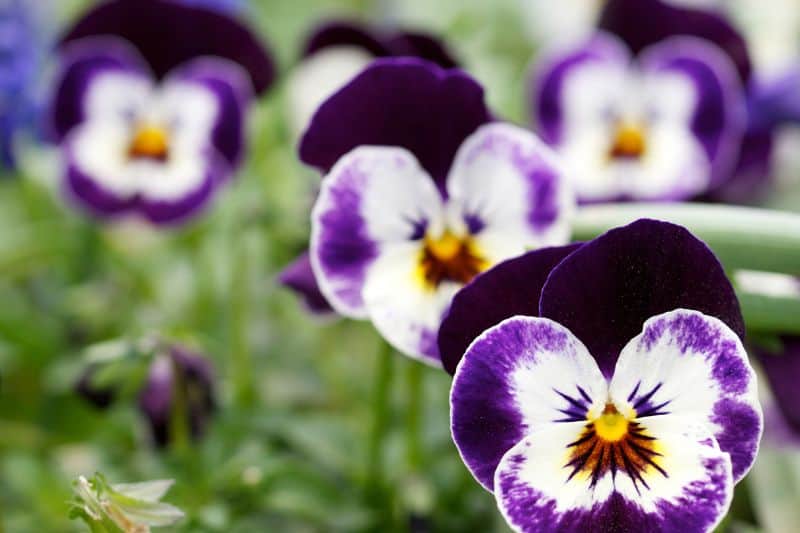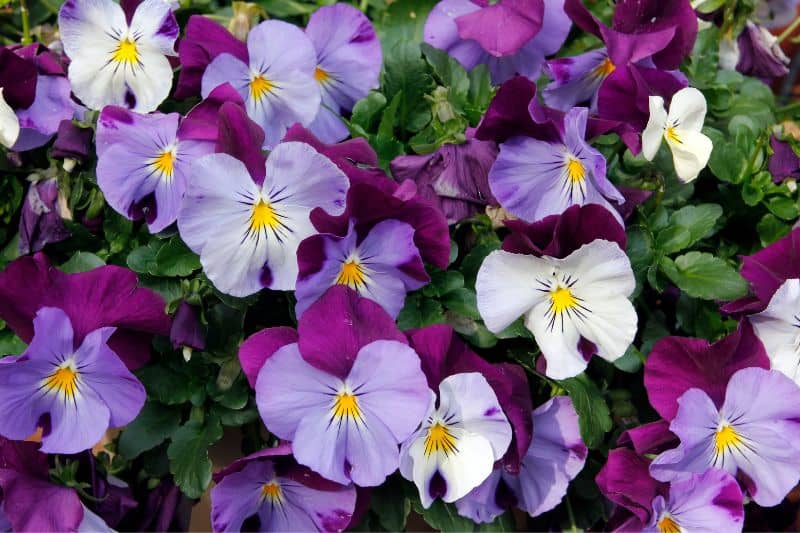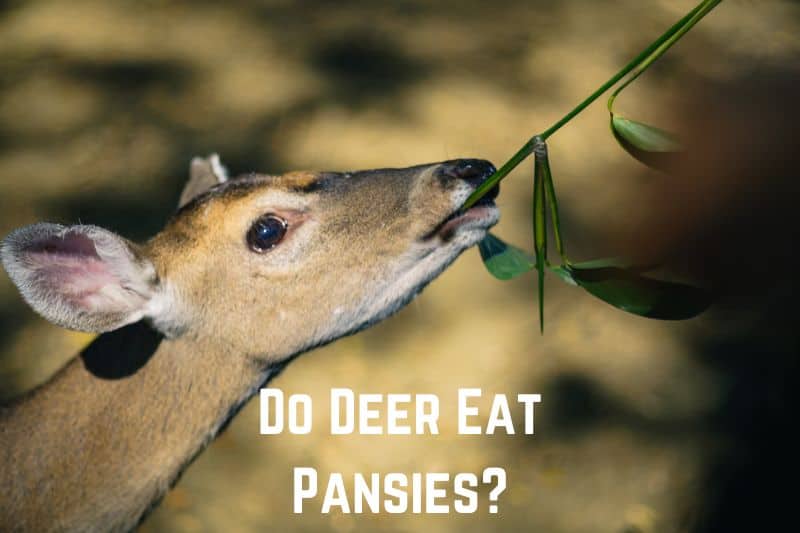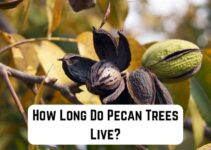Small, bright, and colorful, pansies add a bold and vibrant atmosphere to any garden. Moreover, these round or heart-shaped blossoms are edible even to humans, explaining why many animals love to nibble on them. Yet, it’s important to find out, do deer eat pansies?
For many gardeners, deer are among the biggest contributors to garden plunder and plant damage. So, figuring out whether or not your pansies will fall prey to deer can help you take preventative measures – If you have to. Below, you will find out if you must go the extra mile to protect your pansies from deer.
Read: Do Deer Eat Iris? (No. It Won’t)
What are Pansies?
Pansies or garden pansies are fast-growing perennial or biennial hybrids of the viola plant grown as garden flowers. The garden flowering plants produce single blossoms with five rounded or heart-shaped blossoms, measuring about 2 inches.
Pansies can come in single, clear, or single colors with center radiation black lines. You will commonly come across white, yellow, or blue-colored pansies.
They are sometimes described as cheerful flowers with upturned faces due to their unique color patterns. These beautiful garden flowers are also edible, allowing you to add them to your salads, desserts, or beverages.
Are Pansies Deer Resistant?
Pansies are not deer-resistant. Pansies attract deer due to their colorful look, taste, and scent. Pansies are among the favorite plants for deer to nibble on and unfortunately, these larger animals can do a fair share of damage to these plants.
It is easier for deer to consume a large amount of the relatively smaller pansies in just a single sitting. So, it’s pretty easy to lose entire plants to deer in a short time.
Do Deer Eat Pansies Flowers?
Deers love to feed on the entire shoot system of pansies, including flowers and leaves. However, deer are first attracted by the attractive appearance, intoxicating scent, and the protein-rich benefits pansy flowers offer.
Nonetheless, if undeterred, deer will consume the entire root system of your pansies in a single sitting. Deers typically consume pansies during the spring to summer after emerging from a long and arduous winter. It’s safe to say that these large land-dwelling animals are pretty hungry during this time.

Why Do Deer Eat Pansies?
Deer eat pansies, among other favorite plants, for sustenance. Deer love lush plants, like pansies, that are well water, properly fertilized, and bountiful. So, pansies growing in a well-cared-for and manicured garden will easily fall prey to deer.
However, it’s not only established pansies that fall prey to deer. Newer pansies aren’t safe from deer, either. In fact, deer prefer new pansy growth as they tend to be tender and easier to eat.
Moreover, these ground-growing perennials are easier for the deer to access. Therefore, pansies are most vulnerable during spring as their younger and tender buds pop out.
Deer eat pansies not only for their attractive blossoms and sweet scent. These lush plants are packed with a lot of nutrients these animals need, including proteins, sugar, and water, among others. This makes them an ideal food source for deer.
Unfortunately, a single pansy plant can be very little for deer. This explains why they may eat and “cause damage” to multiple plants in a single sitting. A deer can consume as much as 10 to 15 pounds of food in one day – so you can imagine the time of damage they are capable of.
There may be a slight silver lining to planting pansies. Pansies come in an array of different varieties. This means that the particular type of pansies you add to your garden may not necessarily be what deer in your location love.
So, your pansies will be safe from deer-related damage. Nonetheless, you can’t rely on this reason alone as a measure to deter deer from your pansy garden. It’s best also to incorporate other deer-deterring measures for more reliable security.
Will Pansies Grow Back After Deer Eat Them?
Pansies will generally grow back after deer eat them as they are considered biennials. Pansies grow leaves during the first year, bloom in the second, and then die off. So, depending on which year of the pansy’s life cycle the deer feed on them, they are more likely to grow back.
In best-case scenarios, pansies will reproduce even more flowers if deer eat them before the end of the season. This is because removing the buds allows the plant to conserve its energy. So, the plant can use this excess energy to yield even more flowers when they regrow.
In addition to the growing season, other factors determine whether pansies will regrow after deer feed on them. The extent of the damage will also determine their regrowth. If the plants retain leaves after being eaten, there’s a good chance of regrowth. But, if the damage is extensive across the entire shoot system, the plant may not regrow.
Interestingly, experts from Rutgers University have rated deer damage to pansies as Occasionally Severely Damaged. This rating scale ranged from Rarely Damaged to Frequently Severely Damaged. This means that deer will rarely cause significant damage to pansies.
However, it’s good to take precautions. As a general rule of thumb, if you notice deer damage to your plants, always rehabilitate them. Remove any remaining damaged part, water the plant, fertilize it, and allow it to recover.

How to Keep Deer and Other Pests from Eating Pansies?
You can keep deer and other pests from eating pansies in several ways. These include using natural, physical, and chemical deterrents. Here’s a full list of solutions to help mitigate the deer and pest problem in your pansy garden;
1. Use Natural Means
The least damaging method to keep deer away from pansies is by redirecting them elsewhere. If you have adequate space in your yard, you can always add plants that deer love on the opposite side of the yard away from pansies.
This means that deer will always head towards this side and away from pansies. Just, make sure you have an adequate food supply for them. If they run out, they can easily turn to your pansies.
2. Use Adaptable Planting Methods
The simplest way to naturally keep deer away from pansies is by how you plant them. Simply plant pansies in ways that deer can’t easily access them. These include pots placed in patios, high-hanging baskets, or even borders near high-traffic areas where deer are scared of coming.
3. Use Physical Barriers
Surround pansies with physical barriers, such as fences. But, choose your barriers wisely based on your location and garden setting. While most fences will keep deer out, some may still be susceptible to breaches. Deer are good jumpers and can easily hop shallow fences while small rabbits can maneuver through narrow fences.
Reliable physical barriers include 8-foot chicken wire fences. You can also incorporate other options, like netting, hidden fishing lines, and thorny branches. Less conventional methods, such as sprinklers, reflective surfaces (daytime), and floodlights (nighttime) also work.
4. Use Chemical Deterrents
Chemical deterrents also work, depending on your preferences. You can invest in deer-deterrent sprays that emit scents deer hate. You can also keep it all natural by using natural scent deterrents, such as garlic or fabric softener. You can also DIY deer deterrent spray by mixing rotten eggs with water, hot pepper, or liquid soap.
5. Grow Deer-Deterring Plants
You can also surround your pansies with deer-deterrent plants. These are plants that deer don’t like to eat due to their thorns, needles, prickles, sharp taste, or scents. These include herbs, such as catmint, lavender, mint, rosemary, thyme, and salvia, to mention a few.
Read: Do Deer Eat Geraniums? (And How To Keep it Away?)
You can also pair them with flowers like irises, verbena, and foxgloves. You can use larger bushes and trees in larger landscapes for more effective deterrence. These include boxwood, butterfly bush, hackberry, Japanese maple, magnolia, cedar, and oak.
6. Use Noise Deterrents
Deer don’t like noise and tend to keep away from noisy areas. So, you can use this fear to your advantage and incorporate noise-producing deterrents to spook the deer away. These include electric wires (they produce humming sounds); wind chimes, whistles, and even, flags.
FAQs
How Do I Know Deer Have Eaten My Pansies?
You can easily know if deer have eaten your pansies through nibble marks on the buds, flowers, or leaves- or loss of them overnight. Small round animal droppings and hoof prints around where pansies grow in your garden are another sign of deer visits. You may also notice scrapes higher up on tree trunks as a result of the larger deer (compared to smaller animals like rabbits) scratching the trees with their antlers.
What Plants Do Deer Love to Eat?
Deers love lush, and nutrient-packed plants. They prefer tender, broad-leafed plants without a sharp taste, aroma, or fuzzy parts, like leaves or flowers. These include pansies, roses, plantain lilies, and daylilies. These large animals even feed on vegetables and legumes, such as lettuce, beans, and cabbage.
What Plants are Deer Resistant?
There are several deer-resistant plants that you can consider planting in your garden. Some examples include lavender, marigolds, daffodils, Russian sage, and boxwoods. Keep in mind that deer-resistant does not mean completely deer-proof, as deer may still try to munch on these plants if other food sources are scarce.
What are Alternative Flowers Deer Won’t Eat?
If you’re looking for alternative flowers that deer generally don’t eat, consider planting alliums, iris, foxglove, or hellebores. These plants tend to be less palatable to deer, making them a safer choice for your garden.
Do Deer Eat Other Flowers Similar to Pansies?
Deer may eat other flowers similar to pansies, especially those with tender leaves and bright colors. Some examples include petunias, impatiens, and geraniums. It’s important to understand that deer’s taste preferences can vary depending on their habitat and food availability.






